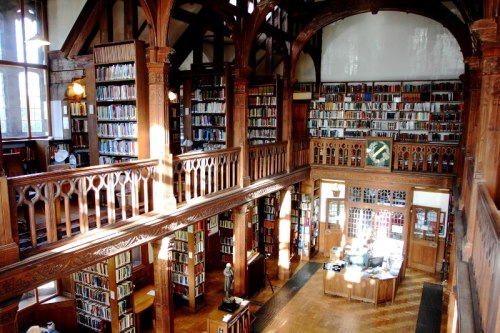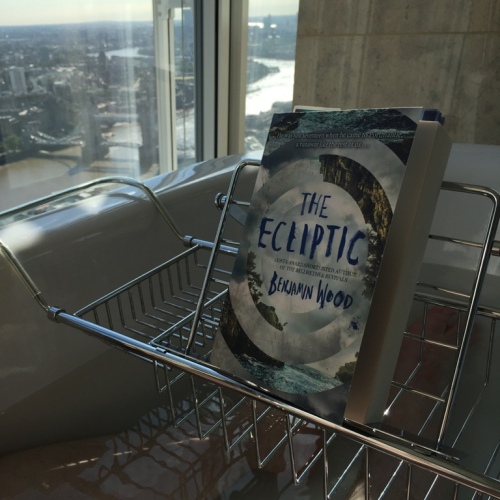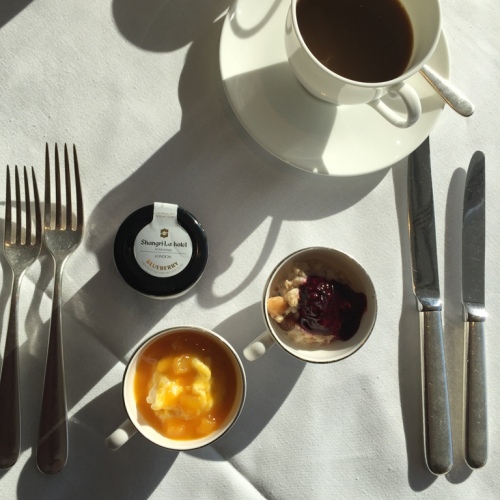Hello and welcome to the latest Other People’s Bookshelves, a series of posts set to feed into the natural filthy book lust we all feel and give you a fix through other people’s books and shelves. This week we are off to Essex to join author Sarah Perry who has just got back from her allotment especially to show us around her shelves. First let’s grab a cuppa and a custard cream and find out more about Sarah…
My first novel, After Me Comes the Flood, came out last year with Serpent’s Tail, and has just been released in paperback. My second novel, The Essex Serpent, is coming out in July 2016 (again with Serpent’s Tail, in an act of spectacular nominative determinism!). I was once a civil servant – largely working in communications, such as writing speeches for government ministers – and then worked for the Council of the Inns of Court while I did a PhD in Creative Writing and the Gothic. I now write full-time, though not just fiction.
At the moment I’m finishing edits on The Essex Serpent. It’s about friendship, desire, sin, love, death and sea-serpents. I talk quite often about my upbringing, and am always afraid it’s going to grow tiresome, but find I’m still asked about it. I was born to a very strict religious family – often, I joke I was brought up in 1895 – and while other girls my age were surrounded by pop culture I was up to my ears in the King James Bible, classic literature, Victorian hymns and Reformation theology. The Gothic quality of my writing and my preoccupation with madness, sin and transgression is therefore not entirely surprising, I suppose.

Do you keep all the books you read on your shelves or only your favourites, does a book have to be REALLY good to end up on your shelves or is there a system like one in one out, etc?
I’m frighteningly acquisitive when it comes to books, and absolutely hopeless at getting rid of them. About three months ago I attempted a cull, and there have been two large bags of books destined for the local charity shops in the middle of my bedroom floor ever since. I seem to gather books as I walk through the week like a magnet attracting iron filings and with about that degree of discrimination. Proofs arrive in the post, I order them online on a whim, am sent them as gifts, throw them into my trolley in the supermarket, grab paperbacks in charity shops, steal – sorry: borrow! – them from friends. They all wind up in one of the many drifts and piles in the house, and I fear many are destined to remain unread for years, if at all. But I can never quite shake the feeling that the day may come when that 80s edition of The Gulag Archipelago, or that little hardback Rumer Godden novel, is going to be exactly what I need…
Do you organise your shelves in a certain way? For example do you have them in alphabetical order of author, or colour coded? Do you have different bookshelves for different books (for example, I have all my read books on one shelf, crime on another and my TBR on even more shelves) or systems of separating them/spreading them out? Do you cull your bookshelves ever?
Some years ago a friend of mine tried to help me order my books (by genre, and alphabetically by author). It took absolutely hours and lasted for less than a week. I can’t begin to fathom how anyone who has a large number of books maintains any sort of order without a fleet of staff. Everything is all bundled in together – I’m looking at a bookcase right now and on a single shelf I can see a biography of William Gladstone, a guide to Jungian dream-symbols, TH White’s The Once and Future King, two Ishiguro novels next to each other (miraculously!), several crime thrillers, and a Puritan book on the doctrine of repentance. If you’re wondering how I ever find anything: I often can’t, and rage about the house accusing the cat of stealing books. My husband has a better memory than me, and can often lay hands on what I need. I do try and keep to some form of TBR system, and went as far as installing two bookcases on either side of the bed, but then I get distracted by something else, and it all goes out of the window.

The only truly organised shelves are those where I’m temporary custodian of a friend’s books: he moved abroad, and left them with me, where I’ve taken to calling them ‘The Memorial Library’. I must say I consider arranging books by colour to be the sure sign of a deranged mind (apologies to any deranged readers).
What was the first book you ever bought with your own money and does it reside on your shelves now?
I honestly can’t remember, and wish very much that I could! I do have lots of books from my childhood, though. I have on my desk here a very battered little Bible story book which I must have had since before school, and I’m very attached to a hardback Paddington bear collection which was a gift from one of my older sisters.
Are there any guilty pleasures on your bookshelves you would be embarrassed people might see, or like me do you have a hidden shelf for those somewhere else in the house?
With very, very few exceptions I really don’t have much truck with the idea of guilty pleasures when it comes to reading. Of course, even the most ardent anti-book snob must draw the line somewhere, and I would sooner go to the stake than have my shelves sullied with Fifty Shades of Grey or Ayn Rand. But I have everything out in the open – so far as the disordered tumult will allow! – and if anyone baulks at the sight of Stephen King, Terry Pratchett and Lee Child jostling cheerfully with WG Sebald, Maggie Nelson and Tennyson then I shall sit them down and have a long, gentle but firmly persuasive chat. I never read romantic fiction, but that is merely a matter of preference, in the same way that I would rather eat cauliflower than mushrooms: it’s not a value judgment. I must confess that if my parents visit I might double check that Catullus or Chuck Palahniuk aren’t knocking about where my Dad might take them off the shelves in an idle moment (there was an awkward moment last year with a Thom Gunn poem).

Which book on the shelves is your most prized, mine would be a collection of Conan Doyle stories my Great Uncle Derrick memorised and retold me on long walks and then gave me when I was older? Which books would you try and save if (heaven forbid) there was a fire?
There are so many of these! May I have a wheelbarrow full? I have a complete Sherlock Holmes which my father gave me: it is a long out-of-print edition, and identical to his own copy, which I grew up reading, and which he is evidently not ready to part with. I have a beautiful vintage edition of Finnegans Wake which a friend gave me when I left London, and since really he deserves it far more than I do I secretly think of it as being in joint custody, like the child of an amiable divorce. When I sold my first novel a friend gave me a copy of A Literary Life by Posy Simmonds, which has got truer and more comforting as the years have passed. There are about half-a-dozen King James Bibles knocking about, most of them associated with events in life: my wedding, or a gift when I was tiny bridesmaid at my oldest sister’s wedding. Once when I had been away for a fortnight my husband met me at the airport with some marmalade sandwiches, two Calvin and Hobbes books and a copy of the Communist Party Manifesto, so I would like those. And I suppose I would like to take the first proof copy of my first novel, with all my anguished handwritten corrections.
What is the first ‘grown up’, and I don’t mean in a ‘Fifty Shades of Grey’ way, that you remember on your parent’s shelves or at the library, you really wanted to read? Did you ever get around to it and are they on your shelves now?
I never really remember there being much of a division between children’s books and grown up books, and I more or less read what I wanted, when I wanted to. Which isn’t to say that I was reading terribly inappropriately (however one defines that) – there wouldn’t have been anything like that in the house, and I wouldn’t have sought it out: since there was so much to read, I was quite content. And so I remember reading Jane Eyre at eight, because it was in an illustrated hardback edition that I mistook for a children’s book, and my father gave me a copy of Tess of the D’Urbervilles when I was ten (greatly to my teacher’s horror). My elder sisters would occasionally conceal slightly fruity novels beneath their beds, which I unfailingly found and would read in a single sitting. The most memorable of these was probably Flowers in the Attic, which I still adore – and which is somewhere on my shelves.
If you love a book but have borrowed the copy do you find you have to then buy the book and have it on your bookshelves or do you just buy every book you want to read?
Greatly to my shame, I never borrow books (unless from friends, in which case ‘borrow’ is often pronounced ‘steal’), and only ever darken the doors of reference libraries, in order to do research. I am simply not to be trusted with library books: they’ll be lost, dropped in the bath, battered, and never returned. It’s a moral failing I’ve long given up trying to remedy.

What was the last book that you added to your bookshelves?
In the last week, I’ve bought Maggie Nelson’s The Argonauts (her memoir Bluets had a profound effect on me last year), Miranda July’s The First Bad Man (which I cannot imagine I will enjoy, having a very low tolerance for quirky books by privileged young New Yorkers, but I though I’d try and conquer my prejudices), Stephen King’s Mr Mercedes, JG Ballard’s Atrocity Exhibition, John Wyndham’s The Trouble With Lichen, and an Anaïs Nin book I immediately lost and can’t remember. I have also been sent a debut novel by Tasha Kavanagh called Things We Have in Common, which I’m looking forward to. Sorry, that’s several books, isn’t it?
Are there any books that you wish you had on your bookshelves that you don’t currently?
Heaps and heaps! I am very close to mugging someone for an advance copy of Hanya Yanagihara’s A Little Life: its August release date seems a terribly long way away, and literally everyone on Twitter has a copy except me. I also would like a facsimile edition (or a real one, if possible) of the Tyndale New Testament, because who wouldn’t? There are also a number of collected letters that I would like. For many years I had a curious ethical disinclination to read the ‘remains’ of writers: I felt that we should read only their work, not diary entries and correspondence they would never have intended for a general readership. But it turns out my principles are paper thin, and I’d particularly like the letters of Virginia Woolf, which I could cross-reference against her diaries.
What do you think someone perusing your shelves would think of your reading taste, or what would you like them to think?
I imagine their first thought would be that I am spectacularly untidy, and furthermore could do with doing some dusting. I wonder if they might then think that these are the books of several people, not only one – if they did, I’d be delighted. I honestly believe we all have a duty to read as widely and deeply as possible. The worst possible reader is the one who wishes only to affirm and bolster their existing world view, and the worst possible response to a book is this: “I just didn’t identify with any of the characters.” As to what I’d like them to think of my reading tastes: I couldn’t give a single solitary toss, I never have, and I never will.

*********************************************************************
A huge thanks to Sarah for taking part in Other People’s Bookshelves, you can stalk her on Twitter here, you can also see her not once but twice at Gladfest this September, where you may just also see me! If you would like to catch up with the other posts in the series of Other People’s Bookshelves have a gander here. Don’t forget if you would like to participate (and I would love you to – hint, hint, hint as without you volunteering it doesn’t happen) in the series then drop me an email to savidgereads@gmail.com with the subject Other People’s Bookshelves, thanks in advance. In the meantime… what do you think of Sarah’s responses and/or any of the books and authors that she mentions?














































